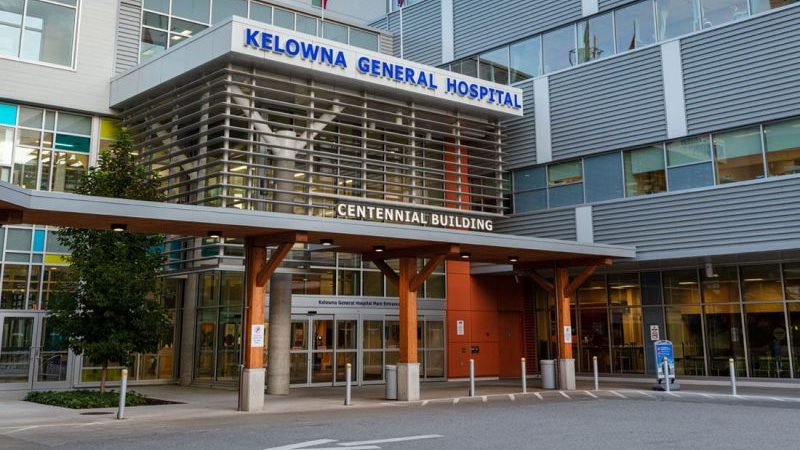I stood at the edge of the packed room in Kelowna General Hospital last Thursday, watching as emergency physician Dr. Caroline Wei struggled to maintain her composure. “We’ve been blindsided,” she told me, her voice dropping to just above a whisper. “One day we’re treating patients, the next we’re being accused of abandoning our posts.”
The emergency department at Kelowna General has become ground zero in an unprecedented dispute between front-line physicians and Interior Health Authority leadership that has left the medical community reeling and patients concerned about emergency care in B.C.’s Interior.
The controversy erupted when Interior Health CEO Susan Brown issued a statement claiming that emergency doctors had threatened to walk off the job, potentially putting patient care at risk. The physicians have vehemently denied these allegations, calling them “completely false” and “deeply damaging” to their professional reputations.
“We’ve never threatened to withdraw services,” Dr. Mark Butterfield, who has worked in the Kelowna ER for over a decade, told me during a brief interview between his shifts. “Our commitment has always been to our patients. To suggest otherwise is not just wrong—it’s devastating to those of us who have dedicated our lives to emergency medicine.”
The conflict centers around a staffing model dispute that has been brewing for months. Interior Health recently proposed changes to physician schedules and compensation structures that emergency doctors say would make the department unsustainable and unsafe.
According to documents provided by the Kelowna Medical Staff Association, the physicians had raised concerns through proper channels, requesting mediation to resolve the dispute. It was after these formal requests that Brown’s statement appeared, catching many off guard.
“We’ve been trying to work through appropriate governance channels,” explained Dr. Jennifer Lund, president of the Kelowna Medical Staff Association. “Our concerns are about patient safety and sustainable care. To have that twisted into accusations that we’re abandoning patients is profoundly unfair.”
The B.C. Medical Association has stepped in, calling for an independent review of the situation. “When trust breaks down between administration and physicians, patients ultimately suffer,” said Dr. Ramneek Dosanjh, president of Doctors of BC, in a public statement released yesterday.
The timing couldn’t be worse for the region. Summer tourism season brings a significant population surge to the Okanagan, typically increasing emergency department visits by 30-40% according to provincial health data. Interior Health’s own statistics show that Kelowna General’s emergency department saw over 82,000 patient visits last year, making it one of the busiest in the interior region.
For patients like Marianne Kowalchuk, a 68-year-old Kelowna resident with chronic heart issues, the dispute creates real anxiety. “I depend on that emergency room,” she told me as we spoke outside the hospital. “My cardiologist is here, my records are here. The thought of those doctors leaving or being replaced with temporary physicians who don’t know the community—it’s terrifying.”
Healthcare advocate Jason Tanner from Patient Voices Network believes the situation reflects a broader crisis in healthcare governance. “This isn’t just about schedules or pay,” he explained when I reached him by phone. “It’s about how we make decisions in healthcare and who has input. When physicians raise concerns about patient care and the response is accusation rather than collaboration, we have a serious system problem.”
The physicians have received overwhelming support from colleagues across the province. More than 300 B.C. doctors signed an open letter to Health Minister Adrian Dix calling for intervention and expressing concern about what they describe as an “increasingly adversarial” approach to physician relations by some health authorities.
Ministry of Health spokesperson Maria Dupuis confirmed that the minister is “aware of the situation and monitoring it closely,” but declined to comment on specific actions being taken to resolve the dispute.
Dr. Wei, who moved to Kelowna five years ago specifically for the collaborative medical environment, fears lasting damage. “Even if this gets resolved tomorrow, the trust is broken,” she said. “How do we rebuild that? How do we continue to recruit excellent physicians to a place where they might be publicly maligned for advocating for better care?”
Interior Health provided a written statement in response to my questions, stating: “We value our physician partners and are committed to finding solutions that ensure sustainable emergency services for Kelowna residents. We regret that our communication has created tension and are working to address physician concerns through appropriate channels.”
But for many doctors, the statement falls short. “You can’t un-ring that bell,” Dr. Butterfield told me. “Those accusations are now public record.”
As I left the hospital that evening, a new shift of emergency physicians was arriving—the same doctors who had been accused of threatening to abandon their posts were showing up, as they always do, ready to care for whoever came through the doors.
The Kelowna Medical Staff Association has requested formal mediation with Interior Health leadership, with the first meeting scheduled for next week. Whether this will begin to heal the rift remains to be seen.
For the community’s sake, all parties hope resolution comes quickly. As patient Kowalchuk said before heading back into the hospital for her appointment: “They need to fix this. We’re the ones caught in the middle, and we’re the ones with the most to lose.”






